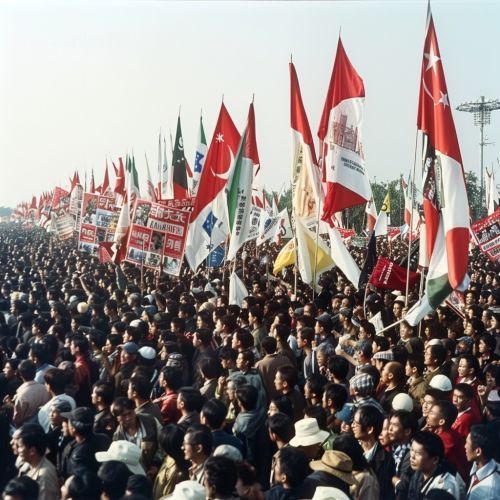Nationalist Party: Difference between revisions
(Created page with "== Overview == The term "Nationalist Party" refers to political parties that advocate for the interests of a particular nation, often emphasizing national sovereignty, cultural identity, and self-determination. These parties can be found across the globe and vary widely in their ideologies, ranging from moderate to extreme forms of nationalism. Nationalist parties often emerge in response to perceived threats to national identity, economic challenges, or political insta...") |
No edit summary |
||
| Line 99: | Line 99: | ||
* [[Trade Protectionism]] | * [[Trade Protectionism]] | ||
[[Image:Detail-91687.jpg|thumb|center|A large crowd of people holding national flags and banners at a political rally.|class=only_on_mobile]] | |||
[[Image:Detail-91688.jpg|thumb|center|A large crowd of people holding national flags and banners at a political rally.|class=only_on_desktop]] | |||
[[Category:Political parties]] | [[Category:Political parties]] | ||
[[Category:Nationalism]] | [[Category:Nationalism]] | ||
[[Category:Political ideologies]] | [[Category:Political ideologies]] | ||
Latest revision as of 03:01, 20 June 2024
Overview
The term "Nationalist Party" refers to political parties that advocate for the interests of a particular nation, often emphasizing national sovereignty, cultural identity, and self-determination. These parties can be found across the globe and vary widely in their ideologies, ranging from moderate to extreme forms of nationalism. Nationalist parties often emerge in response to perceived threats to national identity, economic challenges, or political instability.
Historical Background
Nationalist parties have a long and varied history, often rooted in the broader context of nationalism as a political and social movement. The rise of nationalism in the 19th century, particularly in Europe, was closely linked to the decline of feudalism and the rise of the modern state. The French Revolution and the subsequent Napoleonic Wars played a significant role in spreading nationalist ideas across Europe.
In the 20th century, the two World Wars and the decolonization process further fueled nationalist sentiments. The aftermath of World War I saw the dissolution of empires and the creation of new nation-states, many of which were driven by nationalist movements. Similarly, the post-World War II era witnessed the emergence of nationalist parties in newly independent countries in Africa, Asia, and the Middle East.
Ideological Spectrum
Nationalist parties can be broadly categorized into several ideological spectrums:
Civic Nationalism
Civic nationalism emphasizes the importance of shared values, civic rights, and participation in the political process. It is often inclusive, focusing on the integration of different ethnic and cultural groups within a single nation. Civic nationalist parties advocate for policies that promote national unity and social cohesion.
Ethnic Nationalism
Ethnic nationalism, on the other hand, is based on the idea that a nation is defined by a shared heritage, language, culture, and often, ethnicity. These parties tend to prioritize the interests of a specific ethnic group and may advocate for policies that favor this group over others. Ethnic nationalist parties can sometimes lead to exclusionary or discriminatory practices.
Economic Nationalism
Economic nationalism focuses on protecting and promoting the economic interests of the nation. This can include policies such as trade protectionism, economic self-sufficiency, and opposition to globalization. Economic nationalist parties often argue that such measures are necessary to safeguard national industries and jobs.
Religious Nationalism
Religious nationalism combines national identity with religious beliefs. These parties advocate for the integration of religious principles into the political and social fabric of the nation. Religious nationalist parties can be found in countries where religion plays a significant role in national identity.
Notable Nationalist Parties
European Nationalist Parties
Europe has a rich history of nationalist parties, many of which have played significant roles in shaping the continent's political landscape.
National Front (France)
The National Front, now known as the National Rally, is a far-right political party in France. Founded in 1972 by Jean-Marie Le Pen, the party has been characterized by its anti-immigration stance, Euroscepticism, and advocacy for French nationalism. Under the leadership of Marine Le Pen, the party has sought to rebrand itself and gain broader electoral support.
UK Independence Party (UKIP)
The UK Independence Party (UKIP) is a right-wing political party in the United Kingdom that gained prominence for its strong opposition to the European Union. Founded in 1993, UKIP played a crucial role in the Brexit referendum, advocating for the UK's withdrawal from the EU. The party's platform includes policies on immigration control, national sovereignty, and economic protectionism.
Asian Nationalist Parties
Nationalist parties in Asia have emerged in response to colonialism, regional conflicts, and economic challenges.
Bharatiya Janata Party (India)
The Bharatiya Janata Party (BJP) is a right-wing political party in India that promotes Hindu nationalism. Founded in 1980, the BJP has grown to become one of the two major political parties in India. The party's platform includes policies on cultural nationalism, economic development, and national security. Under the leadership of Narendra Modi, the BJP has pursued a vision of a strong, unified India.
Liberal Democratic Party (Japan)
The Liberal Democratic Party (LDP) is a conservative political party in Japan that has dominated the country's politics since its founding in 1955. The LDP advocates for Japanese nationalism, economic growth, and a strong national defense. The party has played a key role in shaping Japan's post-war political and economic landscape.
Impact on Politics and Society
Nationalist parties have had a profound impact on politics and society in various countries. Their influence can be seen in several key areas:
Political Landscape
Nationalist parties often reshape the political landscape by challenging established political norms and institutions. They can disrupt traditional party systems and force mainstream parties to address issues related to national identity, sovereignty, and immigration. In some cases, nationalist parties have gained significant electoral support and have become major political forces.
Social Cohesion
The rise of nationalist parties can have mixed effects on social cohesion. While some parties promote national unity and integration, others may exacerbate social divisions by promoting exclusionary or discriminatory policies. The impact of nationalist parties on social cohesion often depends on their specific ideologies and policy agendas.
Economic Policies
Nationalist parties often advocate for economic policies that prioritize national interests. This can include measures such as trade protectionism, restrictions on foreign investment, and support for domestic industries. While these policies may benefit certain sectors of the economy, they can also lead to trade conflicts and economic isolation.
Criticisms and Controversies
Nationalist parties are often the subject of criticism and controversy. Some of the main points of contention include:
Xenophobia and Racism
Many nationalist parties have been accused of promoting xenophobia and racism. Their emphasis on national identity and cultural homogeneity can lead to exclusionary policies and discriminatory practices against minority groups. Critics argue that such policies undermine social cohesion and violate principles of equality and human rights.
Populism and Demagoguery
Nationalist parties are often associated with populism and demagoguery. They may use emotive rhetoric and simplistic solutions to complex problems to gain popular support. Critics argue that this approach can undermine democratic institutions and processes, leading to political instability and authoritarianism.
Economic Isolation
The economic policies advocated by nationalist parties, such as trade protectionism and economic self-sufficiency, can lead to economic isolation. Critics argue that such policies can harm economic growth, reduce competitiveness, and limit access to global markets and resources.
Conclusion
Nationalist parties play a significant role in the political landscape of many countries. Their ideologies and policies reflect a wide range of views on national identity, sovereignty, and economic interests. While they can promote national unity and protect national interests, they can also exacerbate social divisions and lead to economic isolation. The impact of nationalist parties on politics and society is complex and multifaceted, and their influence continues to evolve in response to changing political, social, and economic conditions.
See Also


